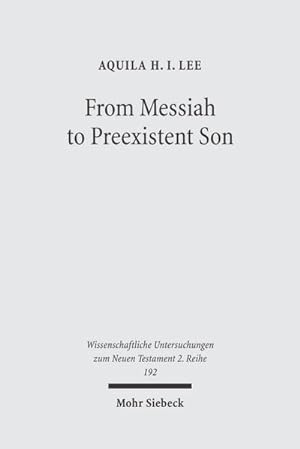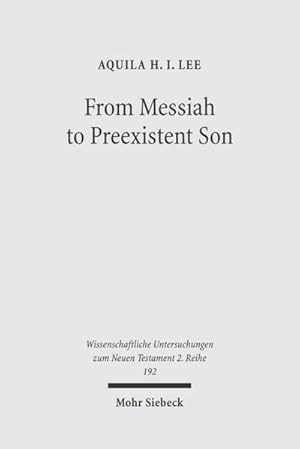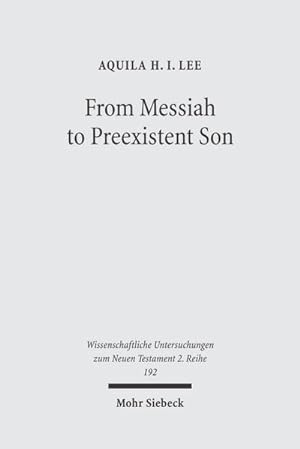mohr siebeck apr 2005 (6 résultats)
Type d'article
- Tous les types d'articles
- Livres (6)
- Magazines & Périodiques
- Bandes dessinées
- Partitions de musique
- Art, Affiches et Gravures
- Photographies
- Cartes
-
Manuscrits &
Papiers anciens
Etat
- Tous
- Neuf
- Ancien ou d'occasion
Reliure
Particularités
- Edition originale
- Signé
- Jaquette
- Avec images
- Sans impression à la demande
Pays
Evaluation du vendeur
-
From Messiah to Preexistent Son
Edité par Mohr Siebeck Apr 2005, 2005
ISBN 10 : 3161486161ISBN 13 : 9783161486166
Vendeur : BuchWeltWeit Ludwig Meier e.K., Bergisch Gladbach, Allemagne
Livre
Taschenbuch. Etat : Neu. Neuware -Aquila H.I. Lee explores the development of early Christian understanding of Jesus as the preexistent Son of God. He first reviews recent attempts to explain the development as a result of the influence of Jewish angelology and similar speculations. In the second part he argues that neither the personification of various attributes of God, including wisdom, nor speculations about principal angels and a preexistent messiah in Second Temple Judaism ever provided a ready-made category for viewing Jesus as a divine and preexistent being alongside God. An examination of the Synoptic evidence for Jesus' self-consciousness of divine sonship and divine mission in the whole context of his life and teaching shows that his self-understanding was open to interpretation in terms of pre-existence. The author also examines the early Christian use of Pss 110:1 and 2:7 against this background. He proposes that the root of preexistent Son Christology is to be found in early Christian exegesis of these two messianic psalms (the catalyst) in the light of Jesus' self-consciousness of divine sonship and divine mission (the foundation). The tremendous impact left by the resurrection event and the resulting conception of Jesus 'literally' enthroned to God's right hand led them to see Jesus as the preexistent Lord and Son of God. In the final part of this book Aquila Lee argues that the pre-Pauline 'sending' formula 'God sent his Son' (Gal 4:4-5; Rom 8:3-4; Jn 3:16-17; and 1 Jn 4:9) derives from this understanding of Jesus as the preexistent Son of God rather than from divine wisdom christology. 375 pp. Englisch.
-
From Messiah to Preexistent Son
Edité par Mohr Siebeck Apr 2005, 2005
ISBN 10 : 3161486161ISBN 13 : 9783161486166
Vendeur : Rheinberg-Buch Andreas Meier eK, Bergisch Gladbach, Allemagne
Livre
Taschenbuch. Etat : Neu. Neuware -Aquila H.I. Lee explores the development of early Christian understanding of Jesus as the preexistent Son of God. He first reviews recent attempts to explain the development as a result of the influence of Jewish angelology and similar speculations. In the second part he argues that neither the personification of various attributes of God, including wisdom, nor speculations about principal angels and a preexistent messiah in Second Temple Judaism ever provided a ready-made category for viewing Jesus as a divine and preexistent being alongside God. An examination of the Synoptic evidence for Jesus' self-consciousness of divine sonship and divine mission in the whole context of his life and teaching shows that his self-understanding was open to interpretation in terms of pre-existence. The author also examines the early Christian use of Pss 110:1 and 2:7 against this background. He proposes that the root of preexistent Son Christology is to be found in early Christian exegesis of these two messianic psalms (the catalyst) in the light of Jesus' self-consciousness of divine sonship and divine mission (the foundation). The tremendous impact left by the resurrection event and the resulting conception of Jesus 'literally' enthroned to God's right hand led them to see Jesus as the preexistent Lord and Son of God. In the final part of this book Aquila Lee argues that the pre-Pauline 'sending' formula 'God sent his Son' (Gal 4:4-5; Rom 8:3-4; Jn 3:16-17; and 1 Jn 4:9) derives from this understanding of Jesus as the preexistent Son of God rather than from divine wisdom christology. 375 pp. Englisch.
-
From Messiah to Preexistent Son : Jesus' Self-Consciousness and Early Christian Exegesis of Messianic Psalms
Edité par Mohr Siebeck Apr 2005, 2005
ISBN 10 : 3161486161ISBN 13 : 9783161486166
Vendeur : AHA-BUCH GmbH, Einbeck, Allemagne
Livre
Taschenbuch. Etat : Neu. Neuware - Aquila H.I. Lee explores the development of early Christian understanding of Jesus as the preexistent Son of God. He first reviews recent attempts to explain the development as a result of the influence of Jewish angelology and similar speculations. In the second part he argues that neither the personification of various attributes of God, including wisdom, nor speculations about principal angels and a preexistent messiah in Second Temple Judaism ever provided a ready-made category for viewing Jesus as a divine and preexistent being alongside God. An examination of the Synoptic evidence for Jesus' self-consciousness of divine sonship and divine mission in the whole context of his life and teaching shows that his self-understanding was open to interpretation in terms of pre-existence. The author also examines the early Christian use of Pss 110:1 and 2:7 against this background. He proposes that the root of preexistent Son Christology is to be found in early Christian exegesis of these two messianic psalms (the catalyst) in the light of Jesus' self-consciousness of divine sonship and divine mission (the foundation). The tremendous impact left by the resurrection event and the resulting conception of Jesus 'literally' enthroned to God's right hand led them to see Jesus as the preexistent Lord and Son of God. In the final part of this book Aquila Lee argues that the pre-Pauline 'sending' formula 'God sent his Son' (Gal 4:4-5; Rom 8:3-4; Jn 3:16-17; and 1 Jn 4:9) derives from this understanding of Jesus as the preexistent Son of God rather than from divine wisdom christology.
-
Westdeutscher Protestantismus und politische Parteien
Edité par Mohr Siebeck Apr 2005, 2005
ISBN 10 : 3161484932ISBN 13 : 9783161484933
Vendeur : BuchWeltWeit Ludwig Meier e.K., Bergisch Gladbach, Allemagne
Livre
Buch. Etat : Neu. Neuware -Michael Klein untersucht das Verhältnis des Protestantismus zu den politischen Parteien in Westdeutschland von der unmittelbaren Nachkriegszeit bis zum Ende der Kanzlerschaft Konrad Adenauers. Dabei nimmt er auch die Vorgeschichte seit der Mitte des 19. Jahrhunderts in den Blick und zeichnet ein kritisches Profil des Arrangements des Protestantismus mit der parlamentarischen Demokratie nach 1945. Der parteipolitische Beitrag von Protestanten findet auf dem Hintergrund der Entwicklungen in CDU/CSU, SPD, FDP, GVP und DP seine Darstellung. Insbesondere werden das nicht unumstrittene Projekt einer interkonfessionellen Partei in der Union und die mühsame Annäherung der Sozialdemokratie an die Kirchen sowie in diesem Zusammenhang auch der politische Weg von Gustav Heinemann, Hermann Ehlers, Heinrich Albertz u.a. kritisch beleuchtet. Der Autor untersucht abschließend auf dem Hintergrund der innerevangelischen Spannungen zwischen dem bruderrätlichen Lager um Martin Niemöller und den konfessionellen Lutheranern das Verhältnis der Evangelischen Kirche und Theologie zu den politischen Parteien in diesem Zeitraum. 527 pp. Deutsch.
-
Westdeutscher Protestantismus und politische Parteien
Edité par Mohr Siebeck Apr 2005, 2005
ISBN 10 : 3161484932ISBN 13 : 9783161484933
Vendeur : Rheinberg-Buch Andreas Meier eK, Bergisch Gladbach, Allemagne
Livre
Buch. Etat : Neu. Neuware -Michael Klein untersucht das Verhältnis des Protestantismus zu den politischen Parteien in Westdeutschland von der unmittelbaren Nachkriegszeit bis zum Ende der Kanzlerschaft Konrad Adenauers. Dabei nimmt er auch die Vorgeschichte seit der Mitte des 19. Jahrhunderts in den Blick und zeichnet ein kritisches Profil des Arrangements des Protestantismus mit der parlamentarischen Demokratie nach 1945. Der parteipolitische Beitrag von Protestanten findet auf dem Hintergrund der Entwicklungen in CDU/CSU, SPD, FDP, GVP und DP seine Darstellung. Insbesondere werden das nicht unumstrittene Projekt einer interkonfessionellen Partei in der Union und die mühsame Annäherung der Sozialdemokratie an die Kirchen sowie in diesem Zusammenhang auch der politische Weg von Gustav Heinemann, Hermann Ehlers, Heinrich Albertz u.a. kritisch beleuchtet. Der Autor untersucht abschließend auf dem Hintergrund der innerevangelischen Spannungen zwischen dem bruderrätlichen Lager um Martin Niemöller und den konfessionellen Lutheranern das Verhältnis der Evangelischen Kirche und Theologie zu den politischen Parteien in diesem Zeitraum. 527 pp. Deutsch.
-
Westdeutscher Protestantismus und politische Parteien : Anti-Parteien-Mentalität und parteipolitisches Engagement von 1945 bis 1963
Edité par Mohr Siebeck Apr 2005, 2005
ISBN 10 : 3161484932ISBN 13 : 9783161484933
Vendeur : AHA-BUCH GmbH, Einbeck, Allemagne
Livre
Buch. Etat : Neu. Neuware - Michael Klein untersucht das Verhältnis des Protestantismus zu den politischen Parteien in Westdeutschland von der unmittelbaren Nachkriegszeit bis zum Ende der Kanzlerschaft Konrad Adenauers. Dabei nimmt er auch die Vorgeschichte seit der Mitte des 19. Jahrhunderts in den Blick und zeichnet ein kritisches Profil des Arrangements des Protestantismus mit der parlamentarischen Demokratie nach 1945. Der parteipolitische Beitrag von Protestanten findet auf dem Hintergrund der Entwicklungen in CDU/CSU, SPD, FDP, GVP und DP seine Darstellung. Insbesondere werden das nicht unumstrittene Projekt einer interkonfessionellen Partei in der Union und die mühsame Annäherung der Sozialdemokratie an die Kirchen sowie in diesem Zusammenhang auch der politische Weg von Gustav Heinemann, Hermann Ehlers, Heinrich Albertz u.a. kritisch beleuchtet. Der Autor untersucht abschließend auf dem Hintergrund der innerevangelischen Spannungen zwischen dem bruderrätlichen Lager um Martin Niemöller und den konfessionellen Lutheranern das Verhältnis der Evangelischen Kirche und Theologie zu den politischen Parteien in diesem Zeitraum.







